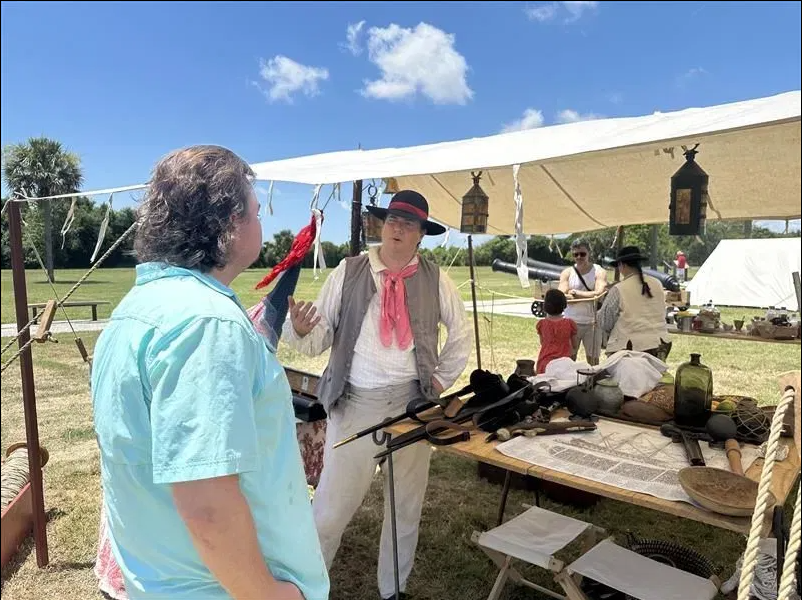Southern Democrats in Washington for the inauguration of President Obama celebrated as much as their counterpoints from across the country. But they also knew they had work to do, with GOP senators, governors and state legislatures cutting a bright red swath through the region. So they used an Inauguration Day gathering to launch South Forward, a program aimed at making gains for the Democratic Party by supporting local candidates.
A kickoff breakfast meeting Monday morning drew about a hundred or so – a mix of politicians and the politically active — to a restaurant close to the swearing-in. It was hosted by Don and Carol Fowler, a former chairman of the Democratic National Committee and a former chairwoman of the South Carolina Democratic Party.
“This is a beginning,” Don Fowler told me. “It is an attempt to identify people in southern states who are loyal and faithful Democrats and who are tired of losing to Republicans.” The way to do that, he said, is to begin with local races — city council, county council and in state legislatures. “That’s the way Republicans started 40 years ago and it worked for them; we don’t believe in many things Republicans do but we think that that’s a good model.”
South Forward is a federal 501(c) 4, known as a federal independent expenditure political action committee, which allows for direct contributions to candidates and state party organizations. Like the Fowlers, it has a Columbia, S.C., address, though Monday’s guests came from a variety of southern states. The group also hopes to mentor and develop a diverse slate of candidates.
“It’s no secret that the Democratic Party and progressives are reeling in the South,” reads the group’s one-page statement. “The Tea Party is ascendant and Republicans have supermajorities in many state houses. Public education, labor, women’s’ health and the very right to vote are under concerted – and successful – attack.”
Why have Democratic candidates and issues had problems breaking through in the South? “Race has a lot to do with it,” Don Fowler said, “and if I told you anything different it would not be honest. The south was solidly Democratic for 70 years because of race, to maintain segregation.” That changed when President Lyndon Johnson and party leaders began to back civil rights legislation.
In addition, he said, the South has always been conservative in social, economic and foreign policy issues, and the Democratic Party is the liberal alternative. “It just became socially acceptable and socially nice to be Republican. … Look at most any southern states, other than Virginia or Florida, we Democrats have an overwhelming majority of the African American vote but only 15 to 20 percent of the white vote.”
A lot more people would be Democrats, he said, “if they understood the issues better” and if the party let them know it wants their votes. “You pick the places where you think have the greatest chances of winning. … If you win a couple of seats in Texas, somewhere in Alabama, in South Carolina, that begets winning.”
While changing demographics are transforming the country– and the South no exception– and newcomers are more likely to vote his way, Fowler said it’s important to convince those who have been here longer and have benefited from Democratic policies that they should be Democrats.
Carol Fowler said one reason the party has a chance for a comeback in the South is because “we no longer have any moderate Republicans.” When President Obama started his first run for the presidency, she was one of the first state party chairs to back him. Her husband supported Hillary Clinton, but eventually lined up behind Obama.
Heidi Campbell-Robinson worked on the Obama campaign, and said she thinks Democrats can build on that effort’s strong ground game to make gains. Campbell-Robinson, who lives in Spartanburg, S.C., and runs a nonprofit life enrichment center in Asheville, N.C., is a former Republican and once worked for former Virginia senator John Warner, a man she called “judicious, a statesman.” The GOP, she said, “has moved more toward extremes.” The Duke Divinity School graduate and ordained United Methodist minister said the Democratic Party has an opportunity to frame its message toward the understanding of caring for “the least of these” in outreach to faith communities.
Does Virginia, a state Obama carried twice, offer a model for southern Democratic success? Susan Swecker of Richmond, who used to chair the southern caucus of the Democratic National Committee, said Republicans didn’t keep up with demographic changes there and moved so far to the right, they “went off the Richter scale.” Red counties and red states benefit from government programs, she said. “Democrats have to learn how to talk to regular voters in the South and Deep South. Our message is good for the middle class.”
Catherine Fleming Bruce of Columbia, S.C., agreed that Democrats “need to look at how we define ourselves and explain things we believe in.” Bruce, a doctoral student who owns a consulting firm, also sees a need to fund and develop candidates who can win. “More people need to be involved and engaged.”
Delores Johnson, also of Columbia, owns a residential care facility and — as a true South Carolinian – a concealed weapon carry permit. Johnson said reaching out is something the president has wanted to happen. “He has reached out and will continue to do this; he wants a unified America.”
Walter Ludwig, a Washington-based political consultant and managing partner of Indigo Strategies, is a committee spokesman and organizer. “Our next steps will be to put together a first-rate advisory board from all over the region, raise some money and work in some municipal elections — likely in Mississippi and Florida — and some Virginia legislative elections this year,” Ludwig said. “And get ready for a busy 2014.”
 Mary C. Curtis, an award-winning multimedia journalist in Charlotte, N.C., has worked at The New York Times, Charlotte Observer and as national correspondent for Politics Daily. Follow her on Twitter: @mcurtisnc3
Mary C. Curtis, an award-winning multimedia journalist in Charlotte, N.C., has worked at The New York Times, Charlotte Observer and as national correspondent for Politics Daily. Follow her on Twitter: @mcurtisnc3



